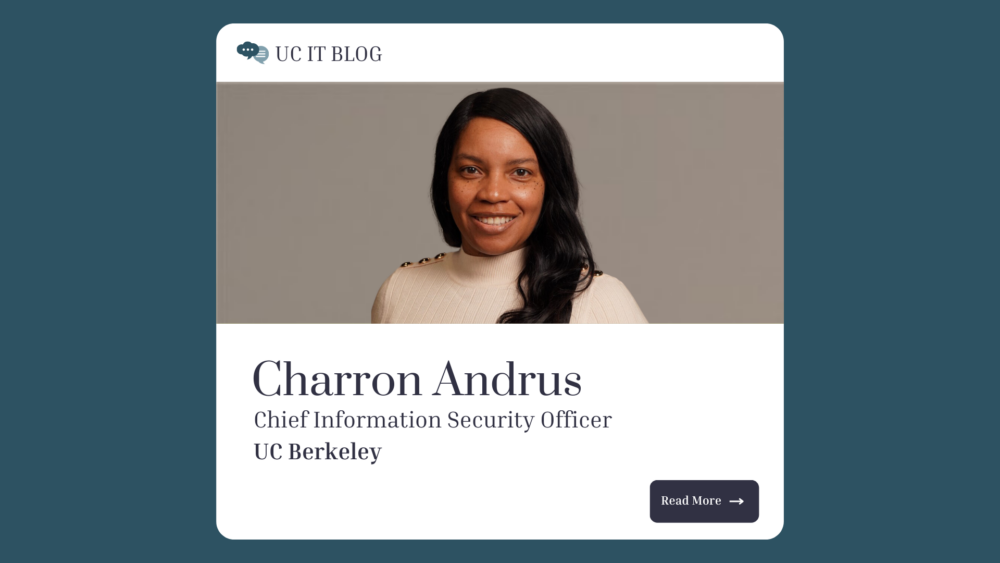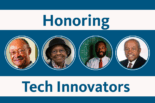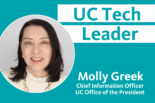Charron Andrus, Associate Chief Information Security Officer (ACISO) at UC Berkeley, recently spent time talking with the UC IT Blog team about her work and vision for improved diversity in the UC tech management and leadership community. Andrus walks-the-walk of diversity and leadership, from generously sharing examples of her contributions in improving diversity directly, on the one hand, to providing recommendations to ensure progress on the other.
Diversity in careers & a developer-mom’s advice
Andrus opened the interview by emphasizing that her career may not be traditional from an IT perspective. Her path, starting in health care and then moving into the technology industry, integrates insights from two industries. This provides a fantastic case example of how diverse backgrounds can support the overall mission of diversity among IT employees. Her statement in regards to her own career provided the first among many important lessons and examples she shared during our conversation.
Andrus earned her Bachelor of Science in Business at Biola University before pursuing a master’s degree in Gerontology at the University of Southern California. Her mother, Bracia Hall who is a systems administrator for UC Davis Health, instilled in Andrus and her sister the importance of having a strong foundation in technology.
Though Andrus started her career in the both the pharmaceutical and the healthcare industries, she found herself with tech-related jobs and responsibilities on an on-going basis. For example, at Optum, Andrus spent 6 years overseeing the financial and population health application sides of the house as well reporting and analytics. She oversaw technical staff and worked on many IT projects but was not a part of a centralized IT group at the time. While her background may not be considered traditional, by IT standards, Andrus holds the belief that her unique career path demonstrates that there can be several routes to a tech career. She emphasizes that possessing a diverse education and experience base is vital for making comprehensive decisions and delivering resilient technology services. She also believes that her own success demonstrates that a strong foundation in technology can be gained through living and working in and around technology areas day-to-day vs a traditional education or career path.
Examining the opportunity for continued progress in technology leadership at the University of California
As a Black woman who has succeeded in rising to the position she has today, Andrus is passionate about promoting diversity, equity, inclusion, belonging, justice, and accessibility in the tech industry. Since she joined the UC about 11 years ago, she recognizes that there has been progress in diversifying the student body and faculty base. However, she believes there is still a long way to go when it comes to staff and technology leadership positions. She references important data points that support this statement. For example, the University of California Office of the President releases annual statistics on the UC Workforce diversity each year. While the top-line figures may appear to demonstrate a growing presence of people of color, she explains, a closer look reveals that many of these individuals are Professional & Support Staff (PSS) positions such as help desk, gardeners, janitorial staff or cafeteria workers. She explains that the data reveals a significant proportion of people of color in lower-waged and PSS roles and a drop-off in Manager & Senior Professional (MSP) positions. This lack of diversity in leadership roles is especially pronounced for Hispanic individuals, as there are very few Hispanic leaders within the UC system. The UC Office of the President data provides a valuable starting point for understanding the scope of the issue, along with the compelling need to address the systemic barriers that prevent people of color from advancing in the tech industry.
In the world of technology, Andrus points out, diversity, equity, inclusion, belonging, justice, and accessibility (DEIBJA) are often treated as separate from the technical aspects of the job. As a manager, she believes it is essential to ensure that employees understand the relevance of DEIBJA in their day-to-day work. She recommends that teams establish diversity goals and that managers encourage employees to be creative and think of ways to incorporate DEIBJA principles into their work at every level. To Andrus, this means not simply checking off items from a list, but implementing change that becomes a part of the work culture – something that plays out in every aspect of our work life. Andrus hopes to see meaningful progress in promoting DEIBJA within the tech industry. Among the great advice she provides, she advocates that her UC tech colleagues capitalize on the resources available to them through EDUCAUSE’s Diversity, Equity, and Inclusion (DEI) Advisory Committee and the EDUCAUSE Diversity in IT Community Group. Andrus is also a leader of this community group.
The steps to building a diverse and inclusive workplace: creating retention strategies
Andrus is passionate about increasing diversity in management and executive roles. Although there has been a big focus on recruiting faculty and students from diverse backgrounds in general, there seems to be a break when it comes to diversifying technology, specifically management and senior leadership positions. This is particularly concerning in the tech industry, where diversity is crucial to creating innovative and inclusive products and services, says Andrus. She points out the following types of support that are vital to building a diverse and inclusive workplace, where effective retention and recruiting of historically underrepresented tech employees can take place:
- Mechanisms to systematically listen to employee feedback and take action to address any issues that arise;
- Creating new resources and opportunities, including mentorship for the historically underrepresented tech community; and
- Ensuring that the historically underrepresented community is aware of the resources available to them through effective outreach.
Andrus’s Accolades and honors – starting with her own son
The UC IT Blog team was grateful that Andrus shared some of her success and accomplishments, which started with her son. She said she is grateful for her son’s academic accomplishments as he has been a source of immense pride for her. In addition to her son’s achievements, Andrus is honored to have won numerous awards and accolades for her contributions to diversity work and leadership development. For example, Andrus is a two-time recipient of the UC Davis Chancellor’s Award for her outstanding work in IT diversity training, she also won the Women’s Day award from the Women’s Status Committee at Davis Health and received a Congressional Recognition for her community advocacy work.
Leading the way in innovation by focusing on people
Andrus also mentioned a recent work project that brings her pride as well. Andrus implemented a program called Deep Focus Days for the security office at UC Berkeley. Once a month, people are provided a day of protected time, without interruptions from meetings or day-to-day work, for teams to work on complex tasks that require focus, such as documentation and problem-solving. Since its implementation five months ago, other departments within Berkeley IT have also adopted the program. Andrus is proud of this recent accomplishment and hopes to see more people join the bandwagon.
Beyond the 9 am to 5 pm: Andrus’ passion for empowering others through volunteerism, writing, and education
In her spare time, Andrus enjoys a variety of activities aimed at helping others. She has published a unique book/resource called the “Simplicity and Joy Planner” that includes goal tracking, journaling, and devotionals all in one book. Andrus also provides education and training on leadership development and goal setting using a minimum baseline framework. Additionally, she is an active volunteer within the UC community and beyond. Andrus has participated in various groups, including co-founding the Black Administrators Council (BLAC@UC), serving as an officer of the Council of UC Staff Assemblies (CUCSA), and serving for 5 years as the Chair of the UC Davis Health African American Faculty and Staff Association (UCDH AAFSA). She has also recently completed her work as a commissioner for redistricting in Sacramento.
Despite her busy schedule, Andrus remains dedicated to helping people live better, fuller, and less stressful lives and welcomes connecting with members of the UC tech community.
[UC IT Blog team interview with Andrus via Zoom.]
About Charron Andrus
Charron Andrus [LinkedIn Profile]
Associate Chief Information Security Officer (ACISO)
UC Berkeley
About the editor

UC IT Marketing Intern
UC Berkeley Undergraduate Student







